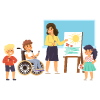Dyslexia is a medical term used to define a learning disorder characterized by trouble faced by children reading resulting from problems identifying speech sounds and learning their connection with letters and words (decoding). The condition is also referred to as a reading disability caused by individual differences in areas of the brain responsible for processing language.
Dyslexia does not cause issues with intelligence, hearing, or vision. It is important to note that most children with dyslexia can excel in school with proper guidance and a specialized education program. Parents and peers should focus on providing emotional support to the child, which plays a crucial role in managing the condition.
The signs of dyslexia can appear very early when the child attends preschool. If you think your child has dyslexia, it is suggested that you look for signs as soon as possible. Here are the signs and symptoms of dyslexia listed through different stages of an individual’s life:
The Preschool Years
Kindergarten & First Grade
Second Grade through High School
Young Adults & Adults
Although the exact cause of dyslexia is not clear, there are some clues that suggest how and why most cases occur:
Genetics: Dyslexia is primarily genetic and runs in families. A child with one or both parents with dyslexia is 30% to 50% more vulnerable to inheriting it. Certain genetic conditions, such as Down syndrome, may also cause dyslexia.
Differences in Brain Development: Dyslexia makes an individual neurodivergent (the brain develops or works differently than expected). As per research, it has been revealed that people with dyslexia have differences in brain structure, function, and chemistry.
Disruptions in Brain Development: Exposures to toxic substances, infections, and other events may affect fetal development, which adds to the risk of the development of dyslexia.
Risk Factors
When to see a doctor
Once you observe signs causing suspicion about your child having dyslexia, such as late talking, learning new words slowly, or issues in forming words correctly (reversing sounds in words or confusing words that sound alike), head straight to a pediatrician without delay.
Dyslexia may cause many issues in a child’s daily life, including the following:
Learning Challenges: Reading is a basic skill in most schools, which may become an issue for a child with dyslexia. Learning issues may lead to trouble keeping up with peers.
Social Issues: If left untreated, dyslexia may cause low self-esteem and behavioral problems. Most children may suffer from anxiety and aggression and do face withdrawal from their peers, parents, and teachers.
Issues for Grown Up: Children are unable to reach their reading and comprehending milestones, which prevent them from reaching their potential as adults and may have serious consequences for other spheres of their lives, such as education, social, and economic.
Children with dyslexia are more vulnerable to developing attention-deficit/hyperactivity disorder (ADHD), and vice versa, this affects a child’s ability to give and retain attention. Many children develop hyperactivity and impulsive behavior, which makes it difficult to treat dyslexia.
Parents play a major role in a dyslexic child's life. What they can do is:
There are certain compensatory strategies and therapies, when combined with professional educational support, that can help in diagnosing dyslexia. This treatment procedure is very helpful in developing reading and writing skills. Professionals also suggest a wide range of techniques and the use of technical aids to help in managing or mitigating the symptoms of dyslexia.
We conduct a detailed psycho-educational evaluation to assess the following listed areas:
The assessment is done according to the age of the child.
Auditory, Visual Discrimination and Classification
The results of the above-conducted test are analyzed in detail, based on which an intervention plan is designed and implemented by us. We also collaborate with the best doctors for consultations to ensure ample support for specially-abled kids.
Children diagnosed with dyslexia need special training. We do provide reinforced collateral training to these kids to help them improve their reading and spelling. Aastha Bhatia is an experienced educator with expertise in employing advanced and proven techniques specially customized for kids with dyslexia.
At Child Therapy Needs, we use techniques and therapies in addition to a comprehensive approach to treatment. We do employ a thorough diagnosis procedure to ensure accurate identification of coexisting conditions such as ADHD or autism. Many times, these conditions may accompany dyslexia. Our team of experienced and expert professionals is well-versed in various therapies, catering to the unique needs of children with multiple conditions. These professionals are supervised by the top pediatric neurologist in Delhi.
It may be a little difficult to diagnose dyslexia at an early age. The symptoms of this condition are usually observed when a child starts schooling. Some of the early signs that one can see in an affected child include:
To start with, it is important to accept that your child has dyslexia, which will help you move on to the next crucial step: treatment. The treatment for dyslexia should start as early as possible to ensure a faster recovery. Here is how you can help your child manage symptoms and lead a better life:
Yes. The child may face issues, depending on the severity of the condition. Some of the common issues are, but are not limited to:
The following factors will increase the individual’s overall risk of developing dyslexia:

Special education is aimed at supporting children with emotional, behavioral, or cognitive challenges. It can also help kids with disabilities related to vision, intellectual, hearing, speech, or learning.
Read More
Occupational therapy involves the use of a special child-centered approach for assessing and treating a child’s functional skills and day-to-day activities.
Read More
Early intervention programs are devised under the guidance of trained professionals with relevant experience in extending the needed support to children and their families.
Read More
Speech therapy involves providing guidance and adequate support to children with challenges in the areas of speech, communication, and language modalities.
Read MoreWe have special treatment options for children with Down syndrome to help improve their quality of life. The therapies prescribed by the treatment option have resulted in significant improvement among children in the age range of 2 to 17 years old.
Read MoreWe provide a wide range of treatment options and therapies aimed at assisting individuals with autism to lead a more productive and independent life. The services do include professional assistance for individuals to help them deal with autism.
Read MoreCopyright © 2023 Child Therapy Needs All rights reserved. designed by Smanik Technologies